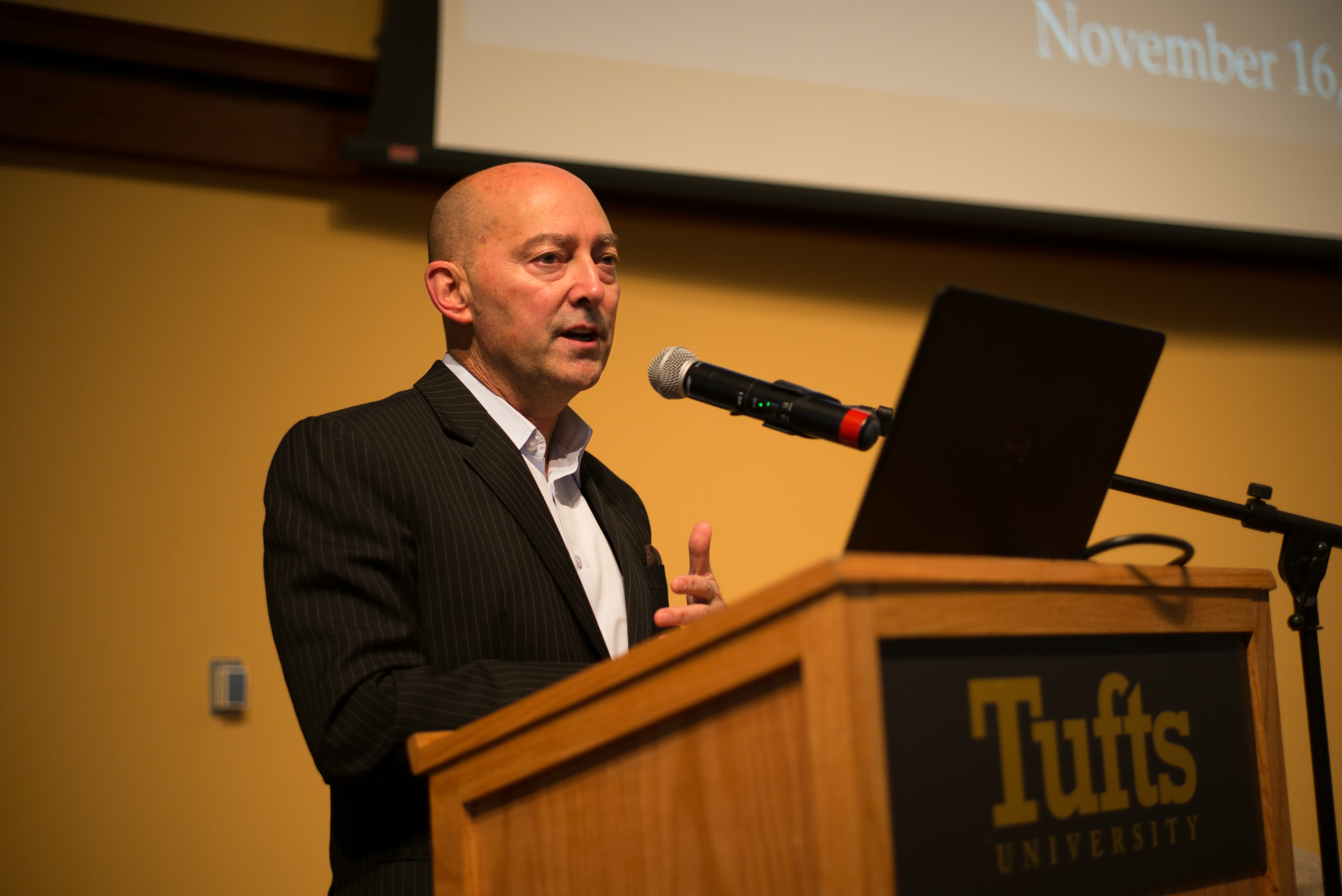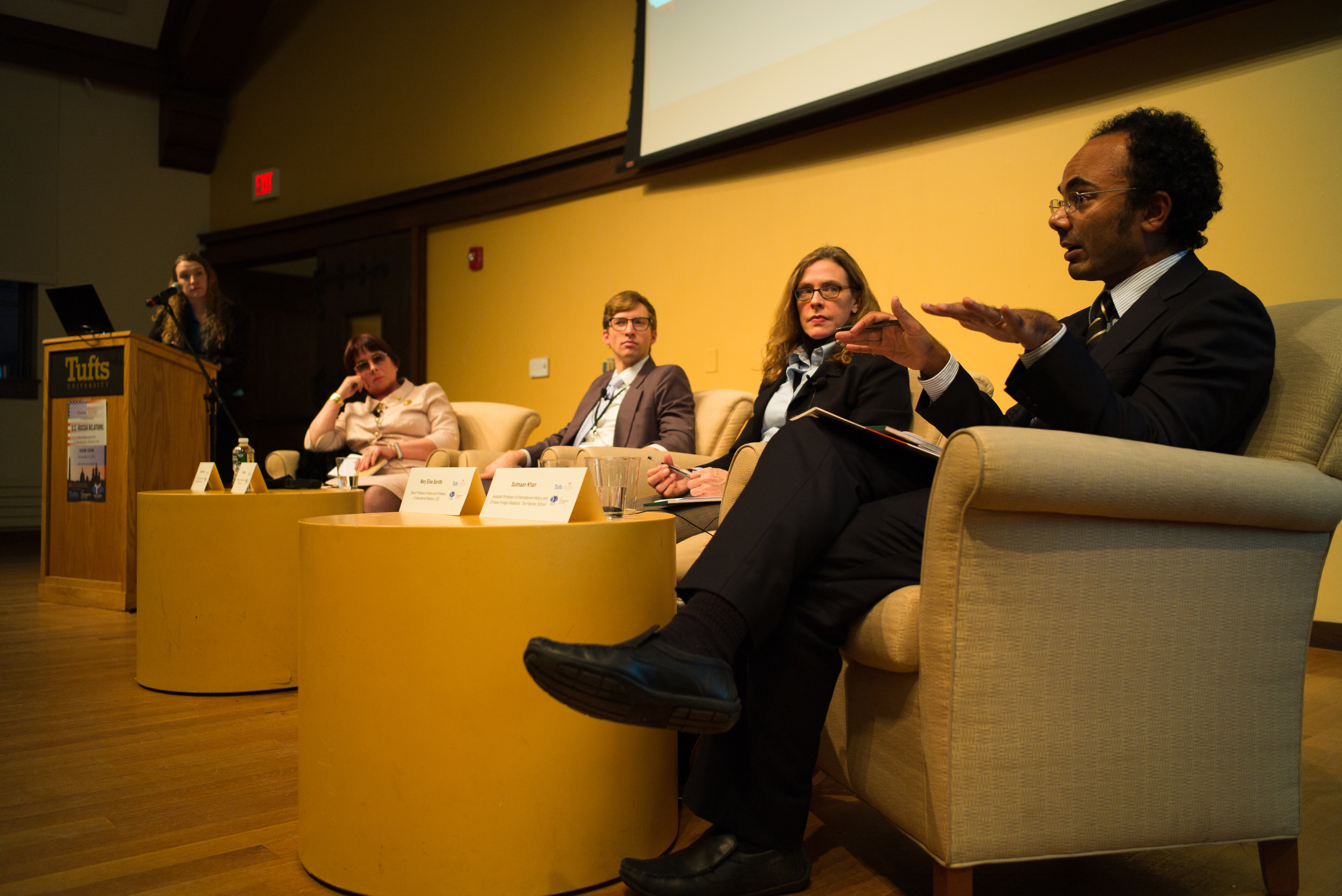
The Fletcher School and MGIMO University Host Conference on U.S.-Russia Relations
Nearly one year after the 2016 U.S. presidential election, with headlines full of rising tensions between the United States and the Russian Federation, The Fletcher School and MGIMO University inaugurated a new series of conferences and exchanges aimed at building mutual understanding and bilateral cooperation between the two countries.
The first Fletcher-MGIMO Conference took place on November 16, 2017 on the Tufts campus and featured experts from Russian and American universities, as well as think tanks, to discuss competing visions of the global order.
The event was comprised of seven panels, which touched upon major areas of contention between the two great powers. Each panel was moderated by students who participate in a course co-taught by Chris Miller, Assistant Professor of International History at The Fletcher School, and Igor Istomin, Senior Lecturer at the Department of Applied Analysis of International Issues at MGIMO University. Prior to the conference, the two professors sat down to discuss their collaborative coursework and some of the issues at the heart of the current U.S.-Russian relationship, which would later figure prominently in discussions during the various conference panel sessions.
“What this conference provides is the opportunity, at a level below the government, to bring these two nations together,” said James Stavridis, Dean of The Fletcher School.
During his opening remarks, Stavridis hinted at the severity of strains between the United States and Russia by asserting that although it would be hyperbolic to describe the current relationship as a new Cold War, there is overwhelming discord between the two countries.
Stavridis’ comments were later echoed by the First Deputy of the Permanent Representative of Russia to the United Nations, Petr Iliichev, who was also in attendance. “Relations between the United States and Russia are at the lowest level since the Cold War,” he said. Iliichev went on to contend that the two countries’ militaries are no longer on the edge of conflict, a view also held by Columbia University’s Kimberly Marten. “The resumption of military to military talks between the U.S. and Russia is crucial for resolving the tensions,” she asserted.
The sharp increase in tensions was a resonant theme; issues such as cyber and information threats, the global economic game, the notion of a liberal world order, and the North Korean crisis were discussed at length and repeatedly named as some of the most serious areas of contention between the U.S. and Russia, as each country’s history and outlook colors their perceptions of the issues.
Sulmaan Khan, Assistant Professor of International History and Chinese Foreign Relations at The Fletcher School, pointed out during his panel on the historical roots of U.S.-Russian friction, that the fall of the Soviet Union was assumed by many U.S. policymakers to mean the end of great power status for Russia. The same was not true, however, for Russians, given that current Russian President Vladimir Putin took that same moment in history to ambitiously set plans to return Russia to its great power status, whilst challenging the United States at every possible turn.
These diverging interpretations of the end of the Cold War have fostered different analytical frameworks for other trouble spots and trends around the world. On questions from regional stability to democratic processes, American and Russian viewpoints differ widely. Where most Americans see their country trying to stabilize the Middle East, Russians tend to see aggression and disregard for international norms. Tatiana Shakleina, Chair of the Department of Applied Analysis of International Issues at MGIMO University, shared a Russian perspective of the situation: “American global strategy is very much militarized.”
The differing perspectives do not end there. In Ukraine, Americans accuse Russia of being a revisionist actor in Europe. Concerning security on the Korean peninsula, views differ not only between the U.S. and Russian governments but also among scholars from both countries. Regarding the highly contentious issue of cyber warfare, there is disagreement as to whether cyber is a new tool with new rules or simply a new platform for a longstanding competition.
Perhaps inevitably, the tendency to lay blame seems to be creeping in on both sides. American scholars such as Professors Joseph Nye, Jr. of Harvard University and Mara Karlin of Johns Hopkins University both served as panelists in the session exploring “Domestic Orders in the Times of Cyber and Information Threats.” They explained the ways in which Russian cyber operations have exploited and influenced elections in the West. “Putin was too clever by half,” Nye said, before going on to explain that Putin’s clumsy and aggressive intrusions into the last presidential election may have actually tied Trump’s hands from being able to work with Russia. Istomin, on the other hand, asserted the Russian perspective on the matter, saying “Western powers are using Russia as a scapegoat for problems in domestic politics.”
Despite growing strains, tensions, and differences of opinion, the conference organizers emphasized the importance of continuing the renewed dialogue between American and Russian experts. Harkening back to the opening remarks put forth by Stavridis, Fletcher 2018 Master of Arts in Law and Diplomacy candidate and discussant Greg Ussery offered closing remarks, aptly capturing the sentiment of the room: “We need these frank conversations…Russian points of view are not heard enough in U.S. policy circles. Once we start talking, we can bridge that divide.”
The next Fletcher-MGIMO conference is scheduled for May 2018 in Moscow on the MGIMO University campus.
This article was republished from Fletcher Features.


